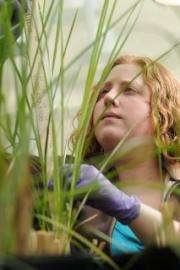Grass Shows Promise for Removing Antibiotics from Water

(PhysOrg.com) -- What goes in must come out, and when animals are given antibiotics, they can find their way into the water supply. Now, a Michigan Tech senior has identified one way to sop them up.
Antibiotics, like many pharmaceuticals, pass through the digestive tract largely unchanged. The resulting drug-laden waste from farms and feedlots (or for that matter, apartments and subdivisions) may be treated, but conventional methods don’t break down excreted antibiotics.
The concentrations are small, probably not enough to have an immediate effect on anyone drinking a cup of water. But by releasing antibiotics indiscriminately into the environment, scientists fear we are encouraging antibiotic-resistant strains of bacteria and making it harder to treat deadly infectious diseases, such as drug-resistant tuberculosis.
“There are also problems with using this contaminated waste to fertilize crops, or the water to irrigate,” says Stephanie Smith, who is graduating in May with a BS in Biochemistry and Molecular Biology.
Working with Rupali Datta, an associate professor of biological sciences, Smith designed an experiment using sterile vetiver grass to address the issue. Vetiver is a native of India often grown in artificial wetlands to cleanse wastewater. It is both vigorous and noninvasive, posing little risk to indigenous plants. It’s also been used to clean up some tough customers, including TNT.
Smith grew vetiver hydroponically in a greenhouse, exposing the plants to various concentrations of tetracycline and monensin, two antibiotics commonly used to treat dairy cattle. “We wanted to see if the vetiver would uptake them, because if you give these antibiotics to cows, 70 percent is excreted in active form,” Smith says. “We worry about them leaching into the groundwater, getting into drinking water and compounding the problem of antibiotic resistance.”
At the end of the 12-week study, all of the tetracycline and 95.5 percent of the monensin had disappeared from the hydroponic solution. Tests showed that the vetiver had taken and metabolized both drugs up into the plant tissue. The results are preliminary, says Smith, but they show that vetiver holds promise for remediating antibiotics in wastewater.
Smith also recorded a peculiar side effect. “The plants in the tetracycline solution grew faster, much faster than the controls,” she says. “The plants in monensin grew somewhat faster, but not as much.”
“When I came to Tech, I honestly didn’t think I would be able to work on a project like this,” Smith adds. “We all get this kind of experience if we want to, and it’s been very cool to be involved.”
Next, the plants will be analyzed to determine what ultimately happens to the antibiotics within the plant tissue.
Provided by Michigan Technological University















